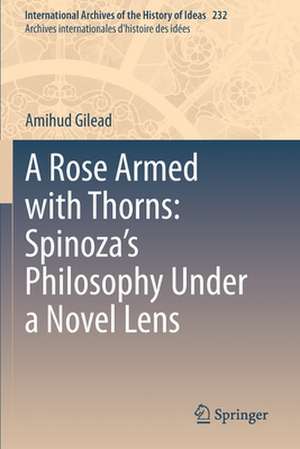A Rose Armed with Thorns: Spinoza’s Philosophy Under a Novel Lens: International Archives of the History of Ideas Archives internationales d'histoire des idées, cartea 232
Autor Amihud Gileaden Limba Engleză Paperback – 12 aug 2021
| Toate formatele și edițiile | Preț | Express |
|---|---|---|
| Paperback (1) | 699.28 lei 43-57 zile | |
| Springer International Publishing – 12 aug 2021 | 699.28 lei 43-57 zile | |
| Hardback (1) | 705.51 lei 43-57 zile | |
| Springer International Publishing – 11 aug 2020 | 705.51 lei 43-57 zile |
Din seria International Archives of the History of Ideas Archives internationales d'histoire des idées
- 24%
 Preț: 679.97 lei
Preț: 679.97 lei - 18%
 Preț: 728.43 lei
Preț: 728.43 lei -
 Preț: 380.25 lei
Preț: 380.25 lei -
 Preț: 382.18 lei
Preț: 382.18 lei -
 Preț: 382.36 lei
Preț: 382.36 lei -
 Preț: 385.84 lei
Preț: 385.84 lei -
 Preț: 381.43 lei
Preț: 381.43 lei -
 Preț: 380.45 lei
Preț: 380.45 lei - 18%
 Preț: 1218.35 lei
Preț: 1218.35 lei -
 Preț: 379.68 lei
Preț: 379.68 lei -
 Preț: 399.29 lei
Preț: 399.29 lei - 18%
 Preț: 950.03 lei
Preț: 950.03 lei -
 Preț: 385.08 lei
Preț: 385.08 lei - 18%
 Preț: 953.20 lei
Preț: 953.20 lei - 15%
 Preț: 648.24 lei
Preț: 648.24 lei - 15%
 Preț: 641.03 lei
Preț: 641.03 lei - 18%
 Preț: 954.93 lei
Preț: 954.93 lei - 18%
 Preț: 944.19 lei
Preț: 944.19 lei - 15%
 Preț: 643.00 lei
Preț: 643.00 lei - 18%
 Preț: 1825.40 lei
Preț: 1825.40 lei - 18%
 Preț: 1224.54 lei
Preț: 1224.54 lei - 15%
 Preț: 644.63 lei
Preț: 644.63 lei - 15%
 Preț: 633.53 lei
Preț: 633.53 lei - 15%
 Preț: 647.08 lei
Preț: 647.08 lei - 18%
 Preț: 1233.06 lei
Preț: 1233.06 lei -
 Preț: 390.25 lei
Preț: 390.25 lei - 18%
 Preț: 945.92 lei
Preț: 945.92 lei - 18%
 Preț: 951.91 lei
Preț: 951.91 lei - 18%
 Preț: 1219.63 lei
Preț: 1219.63 lei - 15%
 Preț: 638.24 lei
Preț: 638.24 lei - 18%
 Preț: 1223.43 lei
Preț: 1223.43 lei
Preț: 699.28 lei
Preț vechi: 822.68 lei
-15% Nou
Puncte Express: 1049
Preț estimativ în valută:
133.85€ • 145.44$ • 112.51£
133.85€ • 145.44$ • 112.51£
Carte tipărită la comandă
Livrare economică 21 aprilie-05 mai
Preluare comenzi: 021 569.72.76
Specificații
ISBN-13: 9783030548124
ISBN-10: 3030548120
Ilustrații: XXIII, 320 p. 1 illus.
Dimensiuni: 155 x 235 mm
Greutate: 0.49 kg
Ediția:1st ed. 2020
Editura: Springer International Publishing
Colecția Springer
Seria International Archives of the History of Ideas Archives internationales d'histoire des idées
Locul publicării:Cham, Switzerland
ISBN-10: 3030548120
Ilustrații: XXIII, 320 p. 1 illus.
Dimensiuni: 155 x 235 mm
Greutate: 0.49 kg
Ediția:1st ed. 2020
Editura: Springer International Publishing
Colecția Springer
Seria International Archives of the History of Ideas Archives internationales d'histoire des idées
Locul publicării:Cham, Switzerland
Cuprins
1. Substance as the Systematic Unity of the Necessary Plurality.- 2. The Status of Individual Things in Spinoza’s Substance.- 3. The Truth Conditions and the Problem of the Attributes.- 4. The First Grade of Knowledge—Imaginatio.- 5. The Second Grade of Knowledge (Ratio) and its Limitations.- 6. The Supreme Grade of Knowledge.- 7. The Desired System as a Goal Laying the Horizon.
Notă biografică
Amihud Gilead was born in Jerusalem in 1947. He is a Professor Emeritus at the Department of philosophy, the University of Haifa. For many years, his main research was devoted to the study of the history of philosophy, especially of early modern philosophy. From 1999 till now he introduced and has elaborated on an original modal metaphysics, panenmentalism, which is a special kind of possibilist realism about individual pure (non-actual) possibilities. Professor Gilead published various books and papers, most of them in English.
Textul de pe ultima copertă
This book presents a systemic analysis of Spinoza’s philosophy and challenges the traditional views. It deals with Spinoza’s concepts of substance, truth conditions, attributes, and the first, second, and supreme grades of knowledge. Based upon an analysis of the relevant details in all of Spinoza’s philosophical works, the book reveals many important points, including the following: Spinoza’s system is not, nor is meant to be, a foundational-deductive system but was meant to be a coherent system of a network model. Spinoza’s reality is not made in the image of a mathematical model. Imaginatio, the first grade of knowledge, and ratio, the second grade, are parts or properties of the supreme grade of knowledge, scientia intuitiva, which is their essence. Finite beings, especially humans, are necessary and eternal (unless they are mistakenly perceived by imaginatio) whereas time, place, and death are simply “entities of imagination.” Thesalvation, happiness, and blessedness that Spinoza’s Ethics offers us, are active and depend only upon us. Concluding a careful examination and interpretation, the book suggests additional novel viewpoints in interpreting Spinoza’s philosophical psychology and political philosophy.
Caracteristici
Is entirely different from any other publication concerning Spinoza’s philosophy Challenges various widespread misunderstandings in interpretations of Spinoza’s philosophy Presents a range of important insights and arguments
